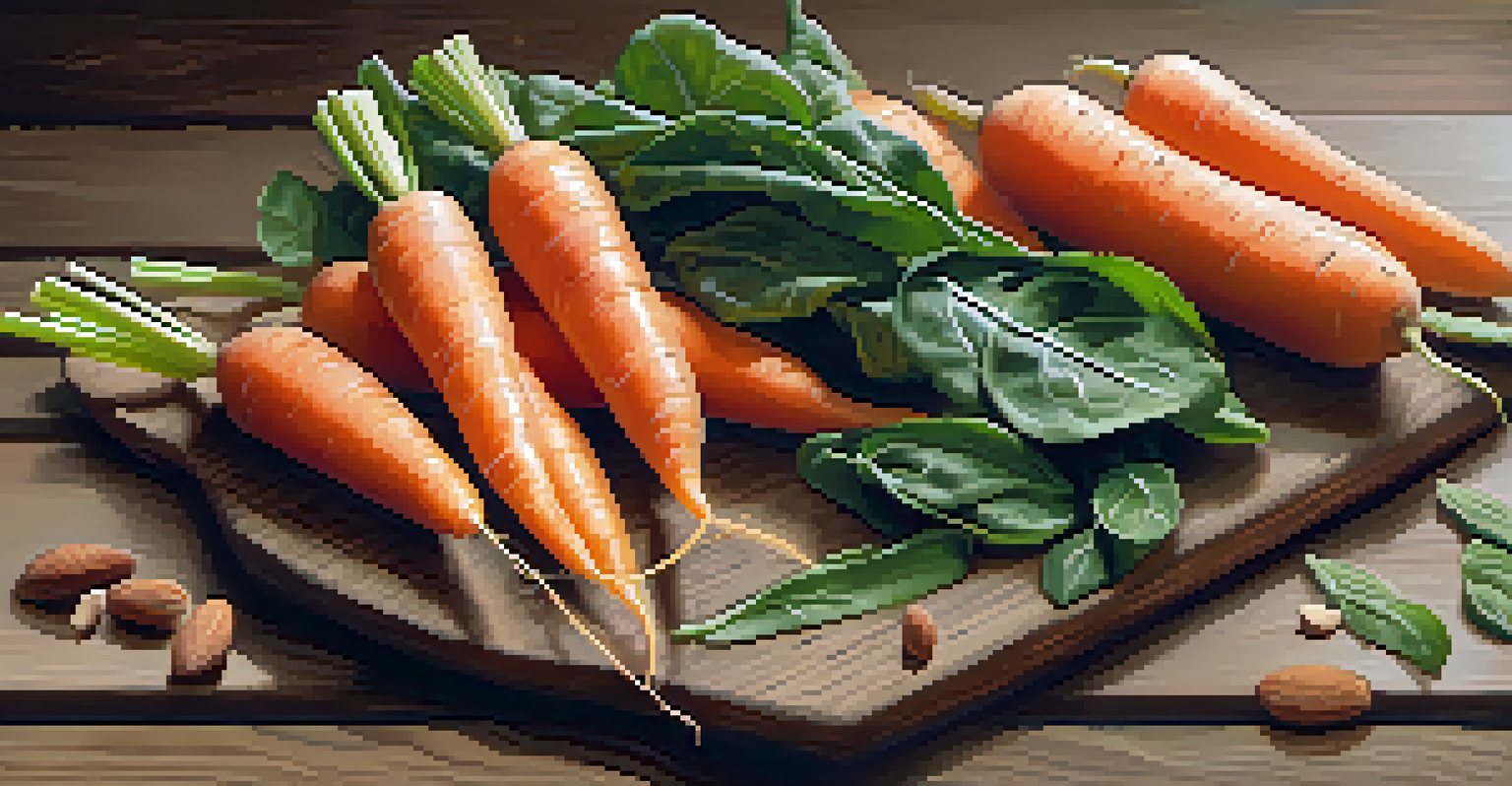Vitamins in Raw Foods: Key Players in Brain Functionality

Understanding Vitamins and Their Role in Brain Health
Vitamins are organic compounds that our bodies need to function properly, and they play a crucial role in brain health. They help with everything from improving mood to enhancing memory and cognitive function. The brain, being an energy-intensive organ, relies heavily on these nutrients to perform at its best.
Let food be thy medicine and medicine be thy food.
Each vitamin has unique properties that contribute to brain functionality. For instance, Vitamin B12 is key for maintaining the health of nerve cells, while Vitamin D is linked to mood regulation. Incorporating a variety of vitamins into your diet is essential for optimal brain performance.
Raw foods, such as fruits, vegetables, nuts, and seeds, are often rich in vitamins, making them a valuable addition to your diet. By choosing to consume these foods in their natural state, you maximize nutrient intake and support brain health.
Vitamin A: The Visionary Nutrient for Brain Function
Vitamin A is well-known for its role in vision, but it also plays a significant role in brain health. This vitamin supports the development of neurons and is crucial for maintaining cognitive functions. A deficiency in Vitamin A can lead to impaired memory and learning capabilities.

You can find Vitamin A in raw foods like carrots, sweet potatoes, and leafy greens. These foods not only provide this vital nutrient but also come packed with antioxidants, which help reduce oxidative stress in the brain. Eating a colorful array of fruits and vegetables can ensure you're getting enough Vitamin A.
Vitamins Boost Brain Health
Vitamins are essential organic compounds that support mood, memory, and overall cognitive function.
Incorporating these raw foods into your meals can be as simple as adding carrot sticks to your lunch or blending spinach into your morning smoothie. It's a delicious way to support your brain's health and functionality.
B Vitamins: The Brain's Energy Boosters
B vitamins, including B1, B2, B6, and B12, are often referred to as the brain's energy boosters. They play a vital role in energy production and the synthesis of neurotransmitters, which are essential for communication between brain cells. This connection is key to maintaining focus, mood, and overall cognitive health.
The brain is like a muscle. When it is in use, we feel very good. It is when we strain it that we feel pain.
Raw foods like whole grains, bananas, and avocados are excellent sources of B vitamins. These foods can be easily incorporated into your daily diet, whether through a fruit salad or a hearty grain bowl. Eating a variety of these foods helps ensure you're meeting your B vitamin needs.
When you nourish your body with B vitamins, you're not just fueling your brain; you're also setting the stage for improved mental clarity and resilience against stress.
Vitamin C: The Antioxidant Powerhouse for Cognitive Function
Vitamin C is renowned for its immune-supporting properties, but it also plays a vital role in brain health. As a powerful antioxidant, Vitamin C protects the brain from oxidative stress and helps improve cognitive function. Additionally, it is crucial for the synthesis of neurotransmitters like dopamine.
You can find an abundance of Vitamin C in raw fruits and vegetables, particularly citrus fruits, bell peppers, and broccoli. By including these foods in your diet, you not only boost your immune system but also enhance your brain's ability to function efficiently.
Raw Foods Enhance Nutrient Intake
Incorporating raw foods like fruits, vegetables, nuts, and seeds maximizes vitamin absorption for better brain health.
A simple way to increase your Vitamin C intake is to start your day with a fresh fruit smoothie or add raw veggies to your lunch. These small changes can have a big impact on your cognitive health.
Vitamin D: The Sunshine Nutrient for Brain Mood Regulation
Vitamin D is often called the 'sunshine vitamin' because our bodies produce it when exposed to sunlight. This vitamin is essential for mood regulation and cognitive function, and a deficiency has been linked to issues such as depression and cognitive decline.
While it's challenging to obtain enough Vitamin D from food alone, certain raw foods like mushrooms can help. They contain a natural form of Vitamin D that can be beneficial, especially for those who may not get enough sun exposure.
Considering the importance of Vitamin D for brain health, it's crucial to find ways to incorporate it into your diet, whether through raw foods or supplements, especially during the darker months of the year.
Vitamin E: The Protector of Brain Cells
Vitamin E is another powerful antioxidant that helps protect brain cells from oxidative damage. It plays a critical role in cognitive health by reducing the risk of neurodegenerative diseases. Ensuring adequate Vitamin E intake can be a simple yet effective way to support long-term brain functionality.
Raw nuts and seeds, such as almonds, sunflower seeds, and hazelnuts, are excellent sources of Vitamin E. Adding a handful of these to your daily snacks or salads can be a delicious way to enhance your nutrient intake.
Diverse Vitamins Work Together
A combination of various vitamins is crucial for maintaining optimal brain functionality and protecting against decline.
Incorporating Vitamin E-rich foods into your diet also provides healthy fats that are beneficial for brain health. So, next time you're looking for a snack, reach for a handful of nuts instead of processed options.
Final Thoughts: Embrace Raw Foods for Brain Health
Incorporating raw foods into your diet is a simple yet effective way to boost your brain's health and functionality. The vitamins found in these foods not only enhance cognitive performance but also protect against mental decline. By focusing on whole, unprocessed foods, you give your brain the nutrients it craves.
Remember, it's not just about one vitamin but a combination of many that work together to support overall brain health. Strive for a varied diet rich in fruits, vegetables, nuts, and seeds to ensure you're getting a well-rounded nutrient profile.

Making small changes to your diet can lead to significant improvements in your cognitive abilities and overall well-being. So, take that first step towards a healthier brain today!